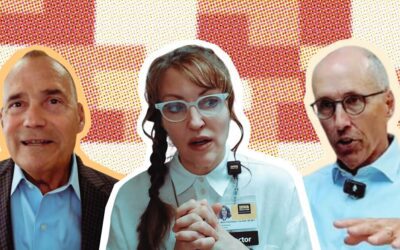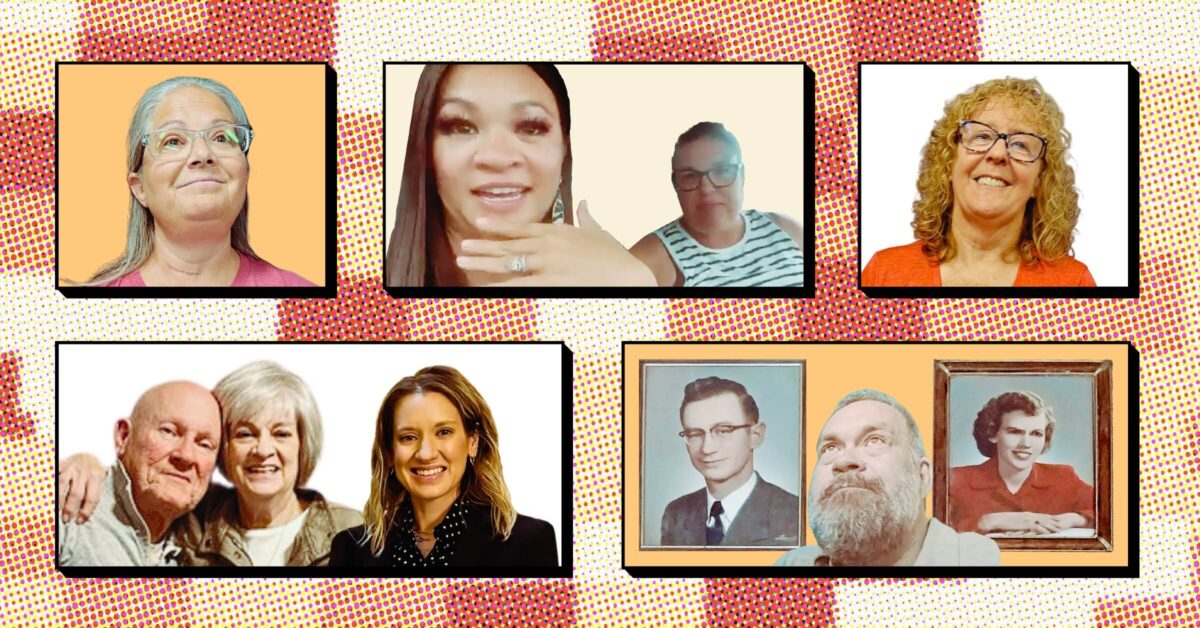
(Images courtesy of subjects / subject families. Francesca Daly / Iowa Starting Line)
Cancer in Iowa isn’t just about the research studies and the statistics. Real Iowans and their families are behind each diagnosis.
Read our first batch of stories here, which focused on those living with cancer. Part two, which features caregivers and advocates, is below.
Cancer connection: Brittney and Jenni

Brittney Stepanek and Jenni Winterhof of Cedar Rapids, in a screenshot from a video recorded by Iowa Starting Line.
Brittney Stepanek and Jenni Winterhof both live in Cedar Rapids. But they didn’t meet until both of their husbands were diagnosed with glioblastoma, a deadly form of brain cancer.
“We’re like sisters by cancer,” Stepanek said, when I called her up and saw Winterhof on the call with her. “We fuel each other’s fire.”
The two have similar stories: Both have young children who go to the same elementary school. Both were thrust into an unexpected fight against a cancer with long odds. And both wanted someone who understood that.
“ We met and it was just like, we just instantly bonded,” Winterhof said. “ We very quickly were meeting, like, every three weeks or so for coffee dates.”
“ Just to check in and bond,” Stepanek added.
”Talk to each other, talk through options, see how we’re feeling, have that great support,” Winterhof finishes. “It was sort of heaven sent.”
When they both lost their husbands in 2023, they started a nonprofit together—both are passionate about continuing to raise awareness and money for brain cancer research.
And they’re continuing to fight for other Iowans. Winterhof has spoken to state Sen. Jack Whitver, who is also battling brain cancer, at their daughters’ volleyball tournament. (Whitver recently announced he was retiring from the Iowa Legislature.)
“I’d like to see some real legislation put through, and quit wasting our time with all this crap that you’re undoing from previous years,” Winterhof said. “Let’s change the narrative of Iowa being the worst place on earth to live.”
“Funding is the obvious one that we need; we need investment, right?” Stepanek added. “But the other part too is like, we don’t have the healthcare expertise in Iowa to care for the existing patients now, let alone for the incoming. So for the second-highest state in the nation with rising cancer rates, we’re not secured to take care of these people—not effectively. And they’re gonna go outside the state to get treatment.”
And they know these folks personally, like a 25-year-old Ames woman who was diagnosed with brain cancer.
“ She’s beautiful and she’s thriving in life and just got married, and she’s battling brain cancer, and she has her whole life in front of her,” Winterhof said. “My goal now is to fight for you and to give you this community and to show you that there are people out there who are—we’re gonna cure this. We’re not giving up.
“And, yeah, my loved one is gone, but the fight continues until my dying breath,” she added. “His fight is now my fight, and we’re not gonna stop.”
Ignoring rural health care puts the onus on families
Molly Hamilton grew up as an only child boating and water skiing in Storm Lake with her parents, Diane and Steve.
But being the only child made adulthood especially hard for Hamilton as both of her parents faced cancer.
Her dad was diagnosed with prostate cancer in 2002, when Hamilton was a freshman in college. Two decades later, her mom learned she had metastatic fallopian tube cancer.

Steve and Diane Hamilton of Storm Lake. (Courtesy Molly Hamilton)
Both are still living. But the resulting medical care hasn’t been easy, particularly for Diane: She had been living at the family’s Storm Lake home while Molly and Steve worked together at a law firm in Des Moines, where an oncologist is “not there frequently,” Hamilton said.
If her mom wasn’t doing well between appointments, she’d need to drive to Sioux City, meaning Molly would have to find her a driver or make the trip to get her from Des Moines—about a two-and-a-half hour drive.
“So we kind of just decided to bring her down here to Des Moines, and she moved in with me,” joining Steve and Hamilton’s four dogs, she said.
It wasn’t easy: Besides shuffling Diane to Iowa City for care between 2022 and 2023, Steve had a TIA or “mini-stroke” during that time, and one of her dogs was hospitalized for diabetes. She believes the stress of everything caused the end of a relationship, too.
“ It was very chaotic,” she said, comparing it to keeping plates spinning. “That time was just like, ‘OK, just get the next thing done.’”
She wants legislators to address Iowa’s crumbling rural health care system. With upcoming cuts to Medicaid, she worries caregivers like her will face an even heavier burden.
“ I think about how fragmented the medical care system is and how difficult it will be, especially when this affects the individuals in rural areas, trying to get providers out into those areas so that people have access to care and continue to have support,” Hamilton said. “Otherwise, it’s so, so difficult.”
Legislators, she said, need to act on the cancer crisis to protect rural communities and family farms across Iowa, “so that a diagnosis isn’t complete devastation and an end to the business.”
The lung screener who wonders about other causes
As a lung cancer screening coordinator registered nurse for MercyOne in Waterloo, Shannon Huey focuses on older current and former tobacco users.
The job is twofold, she said: “ Getting the awareness out to the public so that we’re getting more patients coming in and being screened, [and] catching cancer early or getting cancer treated quicker if there is detection.”
Those eligible are between the ages of 50 and 80 (or 50 to 77 for those on Medicare) who have smoked at least one pack of cigarettes per day for 20 years.
“It doesn’t include vaping, it doesn’t include radon testing,” she said, though she hopes those factors are tested for someday.

Shannon Huey of Waterloo. (Amie Rivers/Iowa Starting Line)
Huey, of Waterloo, has her own family history of cancer: Her son was diagnosed with thyroid cancer at age 23. Her two sons-in-law were diagnosed in their 20s with testicular and melanoma cancers. Her mother and one grandmother had breast cancer. Her other grandmother developed liver cancer.
That brought her out to a cancer listening session at the Waterloo Public Library in August.
“My family and everyone here today has been touched by cancer; what’s causing it? Is it environmental factors?” Huey wondered. “I’m glad that we’re moving past just the hereditary and the things that you can curb or you can make choices for. … We’re finally seeing and focusing on the other factors out there that are causing this.”
Advocating for a change
When Lori Seawel of Hudson was diagnosed with breast cancer in 2011, she spotted a flyer at her doctor’s office for the Beyond Pink Team, a nonprofit organization that focuses on breast cancer and part of the larger Cedar Valley Cancer Committee in Northeast Iowa.
As an educator, Seawel said she felt called to join.
“I felt like I wanted to get engaged with them both for support purposes as well as just to give back to the community and try to teach more people about breast cancer and what it’s all about,” she said.

(Image courtesy Lori Seawel)
Now, she’s on Beyond Pink’s board as the Advocacy Council Chair.
“I like to share my story and I like to try to help other people that might be going through something,” she said.
Beyond Pink Team is also part of the Iowa Cancer Consortium and the National Breast Cancer Coalition, which advocates for breast cancer issues at the federal level.
“We’re all about trying to make a positive difference to lessen the incidences of cancer and cancer deaths in the state of Iowa as well as nationally,” she said.
To help, Seawel said more voices are needed on cancer.
“ It’s hard to make a big difference, but if we team up and we all start talking together, that’s a louder voice, but it also brings more perspectives to the conversation,” she said. “And those perspectives are so incredibly important, because we can’t do a sufficient job of solving these kinds of issues if we don’t have everybody’s perspective.”
Will state legislators step up?
Don Carpenter of Cascade found growing up on his family’s 160-acre farm to be relaxing and peaceful.
“ We did chores, we planted, we harvested; it was nothing like a super farm today, it was just a typical old, family, century farm,” Carpenter said. ”We had a dairy herd who were the most spoiled cows on the face of the earth. Everyone had a name. Everyone got pet when they came in.”
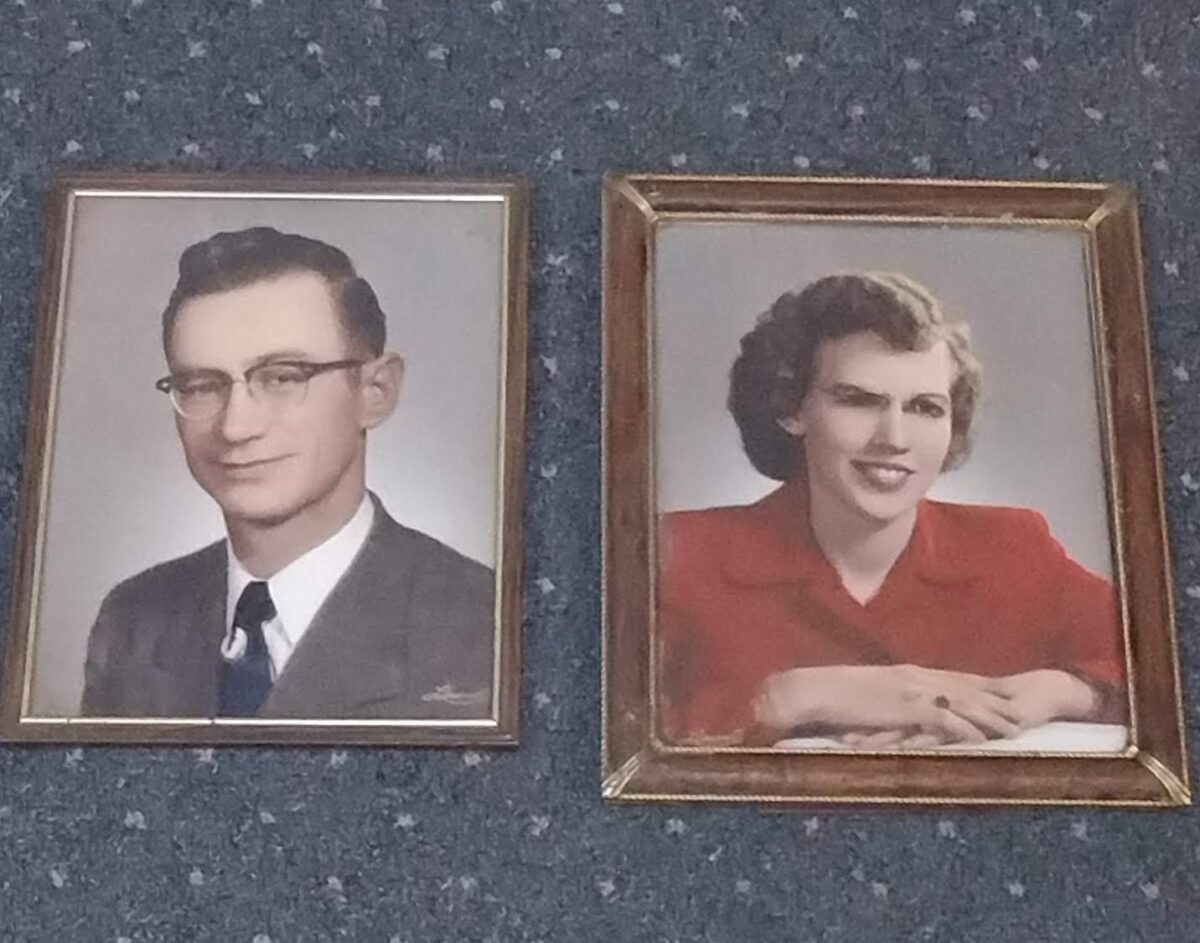
Don Carpenter’s parents (Image courtesy Don Carpenter)
Carpenter’s parents, Floyd and Darlene, both battled cancer: Floyd was diagnosed with stomach cancer and died in 2001, while Darlene developed colon cancer and died in 2015.
Floyd smoked a pipe, but Carpenter thinks farm chemicals played a role in both of his parents’ diagnoses. He’s seen it happen in other farming families, too.
“ This cancer thing’s gonna get far worse if we don’t do something, and we need to do it now,” he said.
He says the state should focus on retaining young doctors through policies that encourage them to stay rather than move out of state, and invest in rural hospitals, particularly in western Iowa.
“There’s not much [there]. And those people deserve care too,” Carpenter said. “ People can’t afford to drive 60 or 70 miles.”
He also thinks a bipartisan committee on cancer, with private citizen input, would be a good idea, along with more education on ways to avoid cancer.
“ And the other big thing: Tell the agriculture industry you’re working with us or else,” he said. “You can work with us, and we’ll work with you, or people are going to get angry and laws are going to be stricter.
“That takes courage,” he added. “And I don’t know if anybody has that courage.”
Want to do something about Iowa’s rising cancer rates? Consider sending your state lawmaker this story. You can look up their email address here.
Support Our Cause
Thank you for taking the time to read our work. Before you go, we hope you'll consider supporting our values-driven journalism, which has always strived to make clear what's really at stake for Iowans and our future.
Since day one, our goal here at Iowa Starting Line has always been to empower people across the state with fact-based news and information. We believe that when people are armed with knowledge about what's happening in their local, state, and federal governments—including who is working on their behalf and who is actively trying to block efforts aimed at improving the daily lives of Iowan families—they will be inspired to become civically engaged.


Zach Nunn backs extending ACA tax credits two weeks after bashing them
US Rep. Zach Nunn’s position on expiring Affordable Care Act tax credits has been all over the place in recent weeks. Nunn, the Republican...

A new car vs. health insurance? Average family job-based coverage hits $27K
By Phil Galewitz, KFF Health News With the federal shutdown entering its fourth week, spurred by a stalemate over the cost of health insurance for...
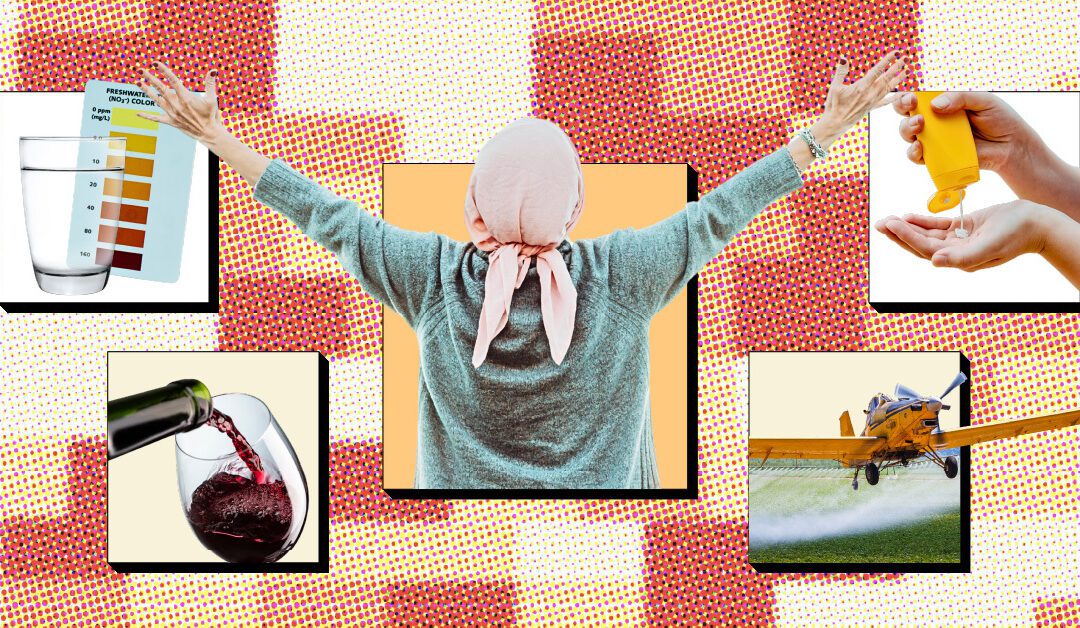
We set out to understand Iowa’s cancer crisis. Here’s what we learned
This story first appeared in the Iowa Starting Line newsletter, which you can subscribe to here. ISL’s series The Hot Spot: Investigating Cancer in...

We sent Iowans nitrate tests to check their water. Here’s what they found
This story first appeared in the Sept. 30 edition of the Iowa Starting Line newsletter. Subscribe to our newsletter to get an exclusive first look...
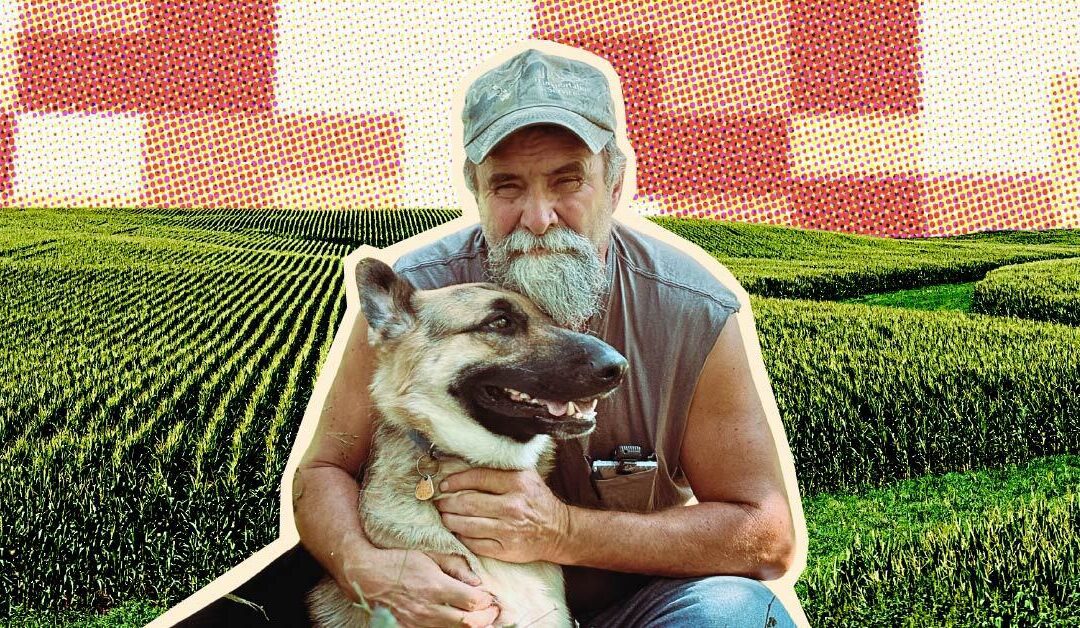
How can policymakers help reduce Iowa’s cancer rates?
This story first appeared in the Sept. 23 edition of the Iowa Starting Line newsletter. Subscribe to our newsletter to get an exclusive first look...

Fighting a health insurance denial? Here are 7 tips to help
By: Lauren Sausser When Sally Nix found out that her health insurance company wouldn’t pay for an expensive, doctor-recommended treatment to ease...






